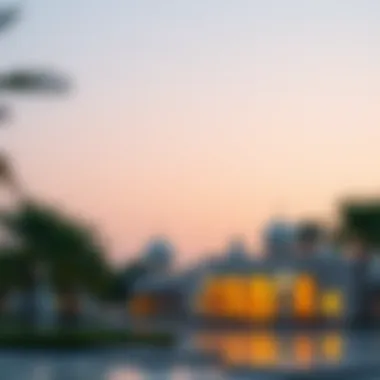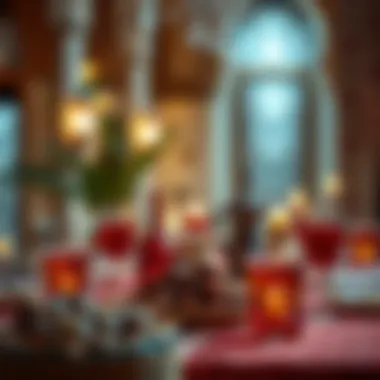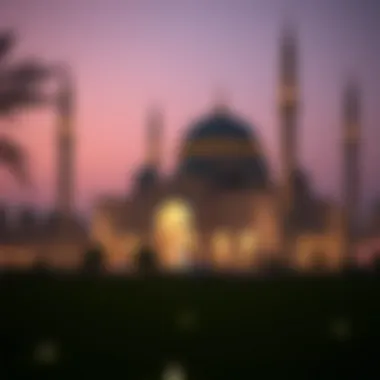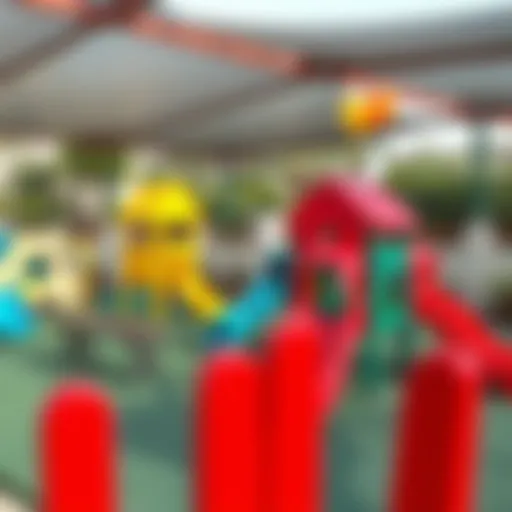Navigating Ramadan 2023 in the UAE: Timing and Significance


Intro
Ramadan is not just a month; it’s a transformative period that unites communities, deepens spirituality, and reshapes daily routines. As the crescent moon marks the beginning of Ramadan 2023, the United Arab Emirates (UAE) gears up for a month rich with cultural significance and profound observances. More than a religious observance, it influences various aspects of life, including social norms, the economy, and even real estate trends.
In this guide, we’ll traverse through the significance of Ramadan, its timings, and the unique cultural practices the UAE embraces during this holy month. Additionally, we’ll delve into practical information, offering insights for both residents and visitors. Understanding Ramadan’s nuances is crucial, especially as it impacts the community structure and economic landscape.
As you read further, expect to find a detailed analysis of market trends and property insights that take shape during Ramadan. This comprehensive overview aims to inform investors, homebuyers, agents, and analysts who wish to navigate through the intricacies of this pivotal time in the UAE.
Understanding Ramadan in the UAE
Ramadan is more than just a month marked by fasting; it’s a time that weaves together spirituality, community, and cultural practice in profound ways across the United Arab Emirates. To understand Ramadan in the UAE, one must delve into its multifaceted significance and the local customs that enrich this holy time.
The essence of Ramadan goes beyond refraining from food and drink during the daylight hours. It signifies a period of reflection, self-discipline, and a reconnection with faith. For many Emiratis and residents, this is a time to strengthen ties with family, foster goodwill among neighbors, and engage in charitable acts. It’s about sharing meals, facilitating community gatherings, and participating in communal prayers, all of which serve to bridge gaps among individuals of diverse backgrounds and beliefs. This shared experience transforms the month into a tapestry of interconnections that benefits everyone involved.
Moreover, the unique cultural blend in the UAE, where traditions from both Arab and expatriate communities merge, enhances the observance of Ramadan. This cultural dynamism contributes to a rich array of practices—ranging from traditional Iftar meals that incorporate regional delicacies such as harees and majboos to modern adaptations that reflect global influences. Each family may have its own special recipes, creating an environment where culinary diversity flourishes.
The Significance of Ramadan
At its core, Ramadan is a time of purification and spirituality. It offers an opportunity for personal growth and an invitation to renew one’s faith. Fasting during the month is not merely a physical challenge. It’s meant to cultivate empathy for those less fortunate, encouraging acts of charity known as Zakat.
In this season of giving, the act of opening one’s fast with the community during Iftar can bring a profound sense of belonging and gratitude. Families often gather to break their fasts together, reinforcing bonds and enhancing community spirit. The evenings are lively with prayers, story-telling, and communal dining, creating an atmosphere that brims with warmth and togetherness.
Yet, Ramadan also holds economic significance for the UAE. Businesses adapt their practices, often extending nightlife hours to cater for Iftar, hence providing an economic boost in the hospitality sector. For expatriates, it is sometimes an eye-opener, where they experience an unfamiliar yet enriching intersection of faith and community spirit.
Historical Context
The historical roots of Ramadan run deep, tracing back to the revelations of the Quran to the Prophet Muhammad. This month is derived from the Islamic lunar calendar, reflecting the time when the holy text was first revealed. The observance of Ramadan has evolved over centuries and is now resonant with local flavor in the UAE, where the rapid modernization has infused traditional practices with contemporary twists.
In the early years of the United Arab Emirates, Ramadan was observed with simple yet profound customs, focusing on prayer and community meals. As the region developed, so did its approach to this holy month. Luxury hotels today offer lavish Iftar buffets, intermixing traditional foods with international cuisines. This juxtaposition mirrors the UAE's journey from pearl diving and trade roots to an economic powerhouse of cultural understanding and coexistence, capturing the essence of Ramadan’s evolution.
It's not only a time of fasting but a revered cultural heritage that contributes to the UAE’s national identity, perpetuating values of tolerance, charity, and civic responsibility. Understanding these layers allows one not only to appreciate the significance of Ramadan but also to engage more meaningfully within the community.
“Ramadan is a month of blessings, a month of mercy, a month of forgiveness.” — Inscription found at the Sheikh Zayed Grand Mosque
Embracing these insights into the significance and historical context of Ramadan lays the groundwork for a richer experience throughout the observance. It’s a time when individuals reflect on their journey, fostering a sense of unity and belonging that echoes well beyond the month.
Ramadan Dates in the UAE
The significance of the dates during Ramadan plays a crucial role in understanding this holy month in the UAE. As Ramadan is centered around the lunar calendar, its timing is tied to moon sightings, which can vary from one location to another. This uniqueness brings spirit and anticipation to the community, uniting people in collective observance while respecting the traditions that have shaped Ramadan over centuries.
Start Date and Moon Sighting
In 2023, Ramadan is anticipated to begin in the evening of Wednesday, March 22, following the sighting of the crescent moon. The moon sighting process holds immense traditional weight in the UAE. As families gather to search the horizon for the crescent, it symbolizes hope, renewal, and the start of a sacred period. In the UAE, the official moon sighting is typically conducted by the Emirates Islamic Affairs and Charitable Activities Department, which announces the start of Ramadan based on the latest observations.
It is worth noting that the actual start of Ramadan can differ by a day depending on local moon sightings. For many, this uncertainty enhances the sense of excitement, as communities come together, sharing in the anticipation and spiritual preparation for the month ahead.
End Date and Eid Celebrations
Ramadan is set to conclude around Friday, April 21, 2023; however, this, too, is contingent upon the moon sighting. The end of Ramadan is marked with Eid al-Fitr, a celebration bursting with joy, gratitude, and communal bonding. This day often begins with special prayers held at mosques, emphasizing reflection and dedication.
Eid is a time when friends and families come together to share meals and gifts, often including traditional dishes that might evoke memories of home. The communal atmosphere is palpable, as the UAE, with its diverse population, enjoys this celebration in various ways. Markets buzz with activity as people shop for new clothes, sweets, and gifts, making it a vibrant time for local businesses.
The timing of Ramadan and its associated celebrations affect economic and social landscapes within the UAE, marking not just a religious observance but a significant community event that underscores unity and shared values.
Understanding the specific dates of Ramadan not only helps in spiritual preparation but also reminds us of the cultural significance this month holds for many in the UAE.
As such, keeping an eye on the moon sighting announcements is essential for anyone engaged in the UAE, be it individuals, families, or businesses. Those looking to invest, run businesses, or simply participate in Ramadan's unique offerings must intelligently navigate these dates.
Fasting Practices During Ramadan
Fasting during Ramadan is not merely an act of abstaining from food and drink; it is a profound spiritual discipline steeped in significance. The practice connects millions of Muslims in the UAE and around the globe, serving as a collective reminder of devotion, empathy, and self-reflection. Here, we delve into the specific aspects that define fasting practices during this blessed month, putting emphasis on the pre-dawn meal, the breaking of the fast, and the diverse culinary traditions that shape meal preparation.
Pre-Dawn Meal (Suhoor)


The pre-dawn meal, known as Suhoor, holds a crucial role in the fasting regimen. This meal is consumed just before the crack of dawn and signifies not only the start of the day’s fast but also an important opportunity to prepare both physically and spiritually. In many homes, families gather to enjoy this meal together, often comprising nutritious foods such as whole grains, fruits, and hydrating liquids, which are choices that aim to sustain energy levels throughout the day.
“Suhoor is the fuel that prepares you for the journey of fasting.”
Traditionally, meals might include dishes like oatmeal, lentil soup, or even eggs paired with whole wheat bread. In the UAE, chickpea dishes and zucchini fritters are also common as they provide nourishment without weighing one down. The timing of Suhoor is of utmost importance because it allows one to complete their meal before the Fajr prayer, which informs them that the fast has begun. The essence of this meal is not lost on many, as its communal nature enhances spiritual bonds among families.
Breaking the Fast (Iftar)
Iftar, the meal to break the fast, is another highlight of Ramadan. Occurring at sunset, this moment is not only about eating but also about gratitude and reflection. It’s customary to break the fast with dates and water, a practice rooted in the traditions of the Prophet Muhammad. Following this, families often indulge in a variety of dishes that reflect both local traditions and global influences.
The meals prepared for iftar can be vibrant celebrations of flavors. Dishes such as harira, a Moroccan soup, or samboosa, the UAE’s version of spring rolls, often graces the table. Groups of friends and family come together to share meals, creating a festive atmosphere that is as important as the food itself.
Despite the exhilaration that comes with iftar, the importance of a moderate approach is still highlighted, encouraging individuals to listen to their bodies after a day of fasting. This meal presents an opportunity to emphasize the values of sharing and community, as many choose to invite neighbors or those in need, reinforcing bonds within the community.
Cultural Variations in Meal Preparation
Culinary practices vary significantly across different cultures during Ramadan, reflecting the vastness of the Islamic world. In the UAE, the influence of various cultures meld into unique offerings that encapsulate the spirit of the season. From Indian biryani to Lebanese tabbouleh, each meal tells a story of traditions and heritage.
Local favorites, such as ouzi, a rice dish with marinated lamb, showcase the UAE’s rich culinary landscape. Even the approach to meal preparation emphasizes community values; many families volunteer to prepare communal meals for those in need, which embodies the charitable spirit of the month.
The diversity in Ramadan meals not only nourishes bodies but also fosters connections among people, bridging gaps through shared experiences. Culinary gatherings during this time are a kaleidoscope of aromas and flavors, a representation of unity amid diversity.
Religious Observances and Practices
The connection between Ramadan and religious observances can’t be emphasized enough. These practices not only mark the month as a period of spiritual enrichment but also bring individuals and communities closer to their faith. For Muslims in the UAE, Ramadan serves as a unique opportunity to focus on spirituality, morality, and social responsibility while engaging with one another in deeper, more meaningful ways.
Increased Prayer and Reflection
During Ramadan, the discipline of prayer intensifies. While daily prayers are a part of Muslim life throughout the year, during this holy month, the practice of Taraweeh—extra prayers performed at night—takes on heightened significance. Ramadan encourages followers to devote themselves to these soulful prayers, making time for reflection and self-assessment. The community finds solace in gathering in mosques, adorned with soft lights and the sound of whispered prayers, to seek forgiveness and guidance.
One might observe individuals flipping through the pages of the Quran, many aiming to complete it during the month. This is not just about reading; it’s a journey of understanding and connecting with the teachings of Islam. Reflection during this time goes hand in hand with the acknowledgment of one's shortcomings—creating an environment ripe for personal growth and improvement.
"In Ramadan, a heart can find its way back to the Divine."
This period isn't merely about fasting, but about reawakening one's spirit and redefining priorities. Beyond self-discipline, individuals often cultivate a sense of community by engaging in discussions about their reflections and prayers and sharing insights with friends and family, fostering familial bonds.
Community Gatherings and Events
Community events surge during Ramadan, illustrating the strength of social ties within the UAE. From charity iftars—where people come together to break their fast—to large-scale communal prayers, the spirit of togetherness reigns supreme.
- Iftar gatherings become more than just a meal; they symbolize a collective act of kindness, as families and friends unite to celebrate the end of the fast each day. Many organizations also host public iftars, welcoming anyone in the community to partake.
- Local mosques often organize evening lectures and discussions to enhance understanding of the month’s significance, creating spaces for deeper learning.
- Charity initiatives proliferate, reminding the community of the importance of giving back, whether through donations or volunteer work. Many people take to the streets, distributing food and essential items to those in need, emphasizing the values of empathy and generosity.
In this manner, Ramadan transcends the individual experience, evolving into a shared journey that cultivates mutual respect and encourages acts of kindness. For many, these observances shape the identity of the UAE and transform the month into a defining period of connection with both faith and community.
Impact on Daily Life in the UAE
The month of Ramadan brings a kaleidoscope of changes to daily life in the UAE. While the spiritual significance resonates deeply with the Muslim community, the practical aspects affect everyone, regardless of their backgrounds. It's not just about fasting; the very fabric of daily routines shifts during this holy month.
During Ramadan, businesses and public services adjust their operating hours, reflecting the unique lifestyle that emerges. For many, this transforms how they plan their days, with increased emphasis on evenings for meals and gatherings. Families often navigate their schedules around fasting hours, a change that’s felt by employers, employees, and service providers alike.
Business Hours and Work Adjustments
The alteration in business hours is perhaps one of the most noticeable impacts during Ramadan. Many companies choose to shorten working hours, enabling employees to break their fast after sunset. Typically, working hours can be reduced from the standard eight-hour day to about six. While this sounds benevolent, it’s crucial for businesses to maintain productivity and operational efficiency.
For example, sectors like finance and telecommunications often adapt their schedules, allowing employees to leave earlier while still juggling customer service demands.
Considerations for Employers Include:
- Flexibility: Offering flexible hours to accommodate diverse employee needs.
- Communication: Keeping the lines open to ensure that expectations are clear.
- Support: Providing resources for employees to cope with the demands of fasting while maintaining work responsibilities.
Public Services and Availability
Public services also reflect the difference Ramadan brings. Local government entities and public facilities, like libraries or community centers, often display adjusted hours. This affects not only governmental work but also public transport schedules, which may see changes to adapt to the fasting routine.
"Ramadan is not a time of slowing down; it’s a time to find a different rhythm to life."


Key Public Adjustments Include:
- Healthcare Services: Clinics may modify their hours to cater to the schedules of both healthcare workers and patients observing fast.
- Transportation: Buses and metro schedules might shift, resulting in altered routes and timing.
- Community Amenities: Parks and recreation areas often see increased foot traffic after iftar, leading these places to remain open later.
Understanding these changes is vital for investors and potential homebuyers who wish to grasp the wider cultural context when navigating the UAE’s dynamic market during this unique period. Investing during Ramadan demands sensitivity to how both community and daily life adapt.
Cultural Etiquette During Ramadan
During Ramadan, the UAE experiences a blend of deep respect and cultural nuances. Understanding etiquette is vital, not just for Muslims, but for anyone engaging in discussions or activities in the region. The essence of respect is threaded throughout interactions, highlighting the societal fabric of unity and tolerance.
Respecting Fasting Individuals
Fasting during Ramadan requires more than just abstaining from food and drink; it’s a profound act of devotion. For those observing the fast, it can be quite challenging at times. Respecting this commitment is crucial.
Here are key points to consider:
- Be Mindful of Public Spaces: Eating, drinking, or smoking in public can be seen as inconsiderate. In many places, especially around cities, you will find designated areas for non-fasters. Be sure to honor these spaces and customs.
- Offer Support: Sometimes a simple gesture can mean the world. If you know friends who are fasting, consider small acts of kindness such as sending them a thoughtful message or inviting them to break their fast at Iftar.
- Understand Emotional Sensitivities: Hunger and thirst can heighten emotional states. One must remain cognizant that fasting can make individuals more irritable or less patient during this holy month.
"In understanding the traditions of another, one deepens their own understanding of humanity."
Dress Code and Public Behavior
Appropriate attire during Ramadan reflects respect for the month and its spiritual significance. There’s an expectation to dress modestly. Here are some points to keep in mind:
- Modesty is Key: Both men and women are encouraged to wear conservative clothing. For women, long skirts or dresses paired with tops that cover the shoulders are suitable. Men, too, should refrain from shorts that expose the knees.
- Behavior Reflects Values: The essence of Ramadan is not only spiritual but also moral. Public displays of affection may be frowned upon. Maintaining a respectful demeanor will go a long way in fostering goodwill during this sensitive time.
- Be Culturally Aware: Each community may carry variations in customs. The UAE is a melting pot of cultures. Observers should be aware that different cultures may embody different practices and attitudes toward dress and behavior.
In summary, adapting to the cultural etiquettes of Ramadan not only clarifies one’s own understanding of other’s practices but also creates an inclusive environment for all. Assessing how one navigates these norms is a testament to the broader respect for diversity and religious observance in the UAE.
Economic Considerations and Real Estate
Understanding the dynamics of Ramadan in the UAE goes beyond religious practices; it encompasses a significant economic aspect that impacts various sectors, including real estate. Often, this period marks a blend of cultural reverence and heightened market activity, providing both challenges and opportunities for investors and residents alike. Recognizing the influence of Ramadan on the economy can aid in better strategic planning for businesses and can influence individual choices regarding residential or commercial ventures.
Changes in Market Activity
During Ramadan, you will find a noticeable shift in market activity. Many businesses, especially those in retail and food services, often see a surge in demand. People flock to supermarkets for preparations for Iftar, leading to an uptick in sales of traditional foods like dates, sweets, and snacks. On the flip side, other sectors might experience a slowdown, particularly in areas like tourism and leisure, as many expatriates and locals adjust their routines to accommodate fasting.
- Retail Sector:
- Real Estate Sector:
- Increased sales volume, especially around food and family gatherings.
- Special promotions and discounts to lure customers preparing for Ramadan.
- Decrease in foot traffic for viewings during fasting hours but potential for increased activity in the evening.
- Availability of rental properties tends to stabilize, as people often stay put during this holy month, dissuading mass relocations.
Investors should keep an eye on these shifts, as the market can react unpredictably during this time. The key is to adapt to the cultural calendar of the UAE, making timing and understanding of community practices essential for good transactions.
Investment Opportunities During Ramadan
Amidst the traditional slow down, Ramadan also unveils a window of investment opportunities that keen investors can take advantage of. Many property development companies and commercial enterprises might offer special Ramadan promotions or flexible payment plans. For instance, many developers in the UAE have taken to launching projects that promise exclusivity and luxury, particularly targeting high-income individuals and expats.
Consider the following points when evaluating investment potentials during Ramadan:
- Buying Power of the Residents: With many people receiving bonuses and tips during Ramadan, there can be an increase in the buying power among residents, particularly in the high-end market. This can create a favorable climate for investments.
- Commercial Spaces gaining popularity: Businesses that cater to Ramadan-themed events, such as catering, decorations, or even venue rentals, may flourish. This is a crucial period for investors looking for commercial real estate to set up shops that align with the festive mood.
- Sustainable Practices: The growing trend toward sustainable living presents unique opportunities for real estate designed with eco-friendly principles. Brands that can resonate with the community’s values during Ramadan may find substantial backing both in sales and rentals.
In summary, smart investors who can read the pulse of the market during Ramadan will likely find themselves at a strategic advantage. Whether it is leveraging cultural phenomena or diving into emerging trends, the economic spectrum during this time can open new pathways in real estate.
“Ramadan is not merely a period of fasting but a unique economic calendar influenced by culture.”
By aligning with local customs and market trends, stakeholders can navigate through this significant month with a deeper understanding, ultimately paving the way for both cultural resonance and financial gain.
Health and Wellbeing During Ramadan
During Ramadan, the focus on health and wellbeing becomes pivotal, especially given the unique fasting practices that define this holy month. For many, it’s not just about abstaining from food and drink but a holistic approach to maintaining physical and mental health. Understanding the nuances of nutrition and hydration, alongside staying physically active, can greatly influence one's experience during Ramadan. This section digs into these crucial elements, ensuring individuals navigate these challenges effectively to reap both the spiritual benefits of fasting and the practical aspects of daily life.
Maintaining Nutrition and Hydration
Eating well during Ramadan is not merely a recommendation; it's essential. The pre-dawn meal, or Suhoor, sets the tone for the day. It’s a common misstep to treat this meal lightly, which can lead to feeling drained and lethargic as the fasting day wears on. Incorporating a balance of complex carbohydrates, protein, and healthy fats is key. Consider foods like oatmeal, whole grain bread, eggs, and avocado. They provide lasting energy while keeping blood sugar levels stable.


To emphasize the importance of hydration, it’s vital to drink plenty of fluids between iftar and Suhoor. Water and herbal teas are excellent choices, as they not only keep you hydrated but also aid digestion. Avoiding excessive caffeine is wise, as it can lead to dehydration. Fruits like watermelon or cucumber can also be beneficial; they have high water content and are refreshing after a long day of fasting.
"During Ramadan, health becomes a balance of nourishing the body and nurturing the soul."
Here are a few tips to consider for managing nutrition and hydration:
- Plan meals ahead: Create a meal plan for Suhoor and iftar, and go grocery shopping accordingly.
- Use flavourful spices: They can make meals satisfying without relying on unhealthy fats or sugars.
- Snack smart: It's tempting to indulge during iftar with sweets. Instead, consider nuts or yogurt, which can satiate without excessive calories.
Physical Activity and Exercise
While fasting can pose challenges to physical activity, it does not mean one must forgo exercise altogether. In fact, regular movement can be beneficial, not just for maintaining fitness but also for mental clarity. However, timing and intensity are everything. Light to moderate exercise is advisable during the non-fasting hours, particularly post-iftar when the body has replenished some energy.
Engaging in activities like walking, yoga, or light strength training can be effectively woven into one's schedule. Studies suggest that exercising for about 30 minutes can enhance mood and keep energy levels more stabilized. Maintaining social connections through group exercises—if done respectfully of fasting—can also contribute positively to mental health.
A few considerations for exercising during Ramadan:
- Listen to your body: It's crucial to recognize signs of fatigue. If you're feeling drained, allow yourself a break.
- Avoid peak heat hours: If you're exercising outdoors, consider early mornings or after the sun goes down to prevent dehydration.
- Set realistic goals: Understand that energy levels may fluctuate during Ramadan, so adapt your workout intensity accordingly.
The Role of Technology and Social Media
In today's fast-paced world, technology and social media act as potent tools, especially during significant cultural and religious observances like Ramadan. In the context of the UAE, where a blend of tradition and modernity thrives, digital platforms have metamorphosed the way individuals connect with one another and experience community events.
The rapid advancement of technology has facilitated myriad opportunities for community engagement, making it easier for people to share experiences, collaborate, and extend their networks. As the month of Ramadan unfolds, these platforms serve not just as communication tools but also as means for spiritual reflection and community bonding.
Additionally, social media allows for the dissemination of valuable information regarding Ramadan practices, timings, and cultural etiquette. It plays a crucial role in bridging gaps between diverse backgrounds, fostering inclusivity, and promoting understanding about the importance of Ramadan across different demographics.
"Technology is a bridge that brings communities together, tears down walls of misunderstanding, and nurtures the spirit of togetherness, especially during sacred times like Ramadan."
Online Iftar Gatherings and Community
With changing lifestyles and the influence of technology, online platforms have become a haven for communal Iftar gatherings. In a way, Ramadan 2023 in the UAE has seen a remarkable shift towards virtual connections. Social media platforms such as Facebook and Instagram host live sessions, where families and friends from various geographical locations can join in to break their fast together, even if they're continents apart.
These online gatherings offer several benefits:
- Accessibility: Everyone can participate regardless of physical location.
- Inclusivity: Those far from their loved ones, such as expatriates, can experience a sense of belonging.
- Variety: Online platforms feature diverse Iftar options, ranging from traditional dishes to unique culinary experiences from around the globe.
Facebook events and WhatsApp groups regularly promote these virtual Iftar sessions, creating a sense of unity among participants. Moreover, users often share recipes, experiences, and stories of their fasting journey, which can further deepen connections and enhance the community spirit during Ramadan.
Apps for Ramadan Planning
The emergence of various mobile applications tailored to Ramadan has transformed how people plan and observe the holy month. These apps serve numerous purposes, beyond traditional calendars, offering functionalities that cater to specific needs for spiritual and practical support during this time.
Some key features often found in popular Ramadan planning apps include:
- Prayer Times: Notifications for prayer schedules, ensuring users don't miss important timings.
- Iftar and Suhoor Reminders: Timely alerts help individuals prepare and gather for meals throughout the month.
- Recipe Suggestions: Many apps provide users with a plethora of recipes suitable for both Suhoor and Iftar, catering to different dietary preferences.
- Charity Options: Features that guide users in locating opportunities to engage in charitable donations, thus fostering a spirit of giving and community assistance during Ramadan.
As the month progresses, these digital tools not only facilitate organizational aspects of fasting but also amplify the spiritual experience for users by encouraging participation in community drives and religious practices. In essence, they bridge convenience with spirituality, making Ramadan more accessible and meaningful for everyone in the UAE.
Reflections on Ramadan Experience
Exploring the reflections on Ramadan is a significant aspect of understanding this holy month in the UAE. It transcends mere personal observance, revealing the layers of community ties and individual growth. As the Ramadan month unfolds, moments of self-reflection become pivotal; they're opportunities for spiritual renewal that bring people closer to their faith and to each other.
In this article, we focus on the transformative power of Ramadan, examining how fasting extends beyond physical abstention from food and drink. It fosters a deeper introspection, heartening communities to share personal stories and collective experiences. Understanding these reflections can help appreciate not just the spiritual dimension, but also the social fabric that Ramadan weaves in the UAE, enriching life for residents and visitors alike.
Personal Stories and Anecdotes
Personal stories during Ramadan often highlight moments of revelation and connection. Consider the experience of Ahmad, who shares how fasting has enhanced his family gatherings. Each Iftar meal becomes a storytelling moment, where laughter mixes with heartfelt introspection. Traditions are passed down from grandparents to children, creating a tapestry of memories that also serve as lessons in empathy and togetherness.
Similarly, Fatima recounts her first Ramadan experience in Dubai as someone new to the culture. The warmth of the community was palpable; she felt embraced by neighbors who invited her to share Iftar. The act of breaking fast together became a bridge that transcended language barriers and cultural differences. This sharing fosters understanding, community building, and a sense of belonging, reinforcing the core values of Ramadan.
"Ramadan isn't just about fasting. It's about connecting, growing, and understanding what truly matters in our lives."
– Fatima, Emirati resident
Collective Community Experience
The collective experience during Ramadan in the UAE brings people from all walks of life together, often resulting in unique community-driven initiatives. Across the country, mosques fill with worshippers; the air buzzes with a spiritual fervor. Iftar events are held at community centers, workplaces, and public spaces, reinforcing social bonds.
Many feel the motivation to join in charitable acts during the month. Programs like the one organized by the UAE Red Crescent encourage donations and volunteering, emphasizing the spirit of giving that Ramadan embodies. Residents often participate in these programs, further amplifying feelings of community pride and engagement.
In addition, social media plays a role in sharing these experiences. Hashtags related to Ramadan allow users to document their journey, share meal preparations, and connect with a broader audience. This reflection not only showcases cultural practices but also brings a touch of global awareness, showcasing the diversity within unity. The collective reflective experiences underscore the communal strength that defines Ramadan in the UAE, making it more than just a month of fasting.
The narratives and community initiatives resulting from personal and collective experiences during Ramadan are fundamental. They reflect how spiritually intertwined lives can flourish in unity, tolerance, and shared hope. As we navigate through this holy month, the importance of sharing these reflections amplifies the essence of Ramadan and charts a path towards spiritual and social growth in the UAE.















